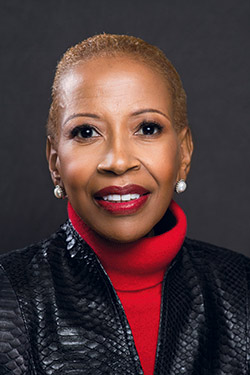As CEO and president of Women’s Foodservice Forum (WFF) for the past five years, Hattie Hill makes it her mission to collect research, insights and best practice solutions in order to help close the workplace gender gap in the foodservice industry. The group’s annual conference, March 10 to 13 in Dallas, marks its 30th anniversary. Hattie is also the founder and CEO of Hattie Hill Enterprises (HHE), a management and human relations consultancy in Dallas.
FE&S: What are your goals for WFF this year?
HH: In 2017 we engaged 32 forward-thinking companies to participate for the first time in a Women in the Workplace Study by  Hattie Hill, CEO and President, Women’s Foodservice Forum, Dallas McKinsey & Company and LeanIn.org to gain specific insights about where women face barriers to advancement and how to accelerate women’s progress and drive business growth. In 2018, more than 60 companies participated in the study, creating an even more robust data set and engaging our industry in unprecedented collaboration to advance women leaders. In 2019 we will continue to expand participation in the study and launch the industry’s first Gender Equity Index (GEI). Our industry-specific GEI will measure industry improvement over time and enable our partner companies to benchmark their progress.
Hattie Hill, CEO and President, Women’s Foodservice Forum, Dallas McKinsey & Company and LeanIn.org to gain specific insights about where women face barriers to advancement and how to accelerate women’s progress and drive business growth. In 2018, more than 60 companies participated in the study, creating an even more robust data set and engaging our industry in unprecedented collaboration to advance women leaders. In 2019 we will continue to expand participation in the study and launch the industry’s first Gender Equity Index (GEI). Our industry-specific GEI will measure industry improvement over time and enable our partner companies to benchmark their progress.
FE&S: What changes are in store at WFF?
HH: One of the most exciting aspects of WFF’s initiative to lead the way to gender equity in the food industry is that we are one of the few organizations that is both developing women as leaders so that they are prepared for advancement and developing organizations so they are prepared to create environments that enable women to advance and thrive. Our comprehensive approach enables WFF to provide direct strategies to the food industry as well as a success roadmap to help companies eliminate barriers, accelerate advancement of women in their organizations and drive greater business growth.
FE&S: Why is now such an important time for women in foodservice?
HH: Several factors have come together to make this an especially important window of opportunity for women and the companies committed to their advancement. The business case for gender equity is well established today through a deep body of research that shows more gender-diverse organizations drive better decision-making and stronger consumer insights, win the war for talent and are more profitable. In addition, our industry faces a critical talent shortage and winning the war for talent means winning the war for women.
Through WFF and our Lead the Way initiative, our industry is engaged in unprecedented collaboration to move the needle on gender equity. Finally, the #MeToo, #TimesUp and other recent movements in support of women’s rights have moved our agenda to the top of the national conversation as well, increasing interest in and demand for solutions that break down barriers for women and accelerate their advancement.



